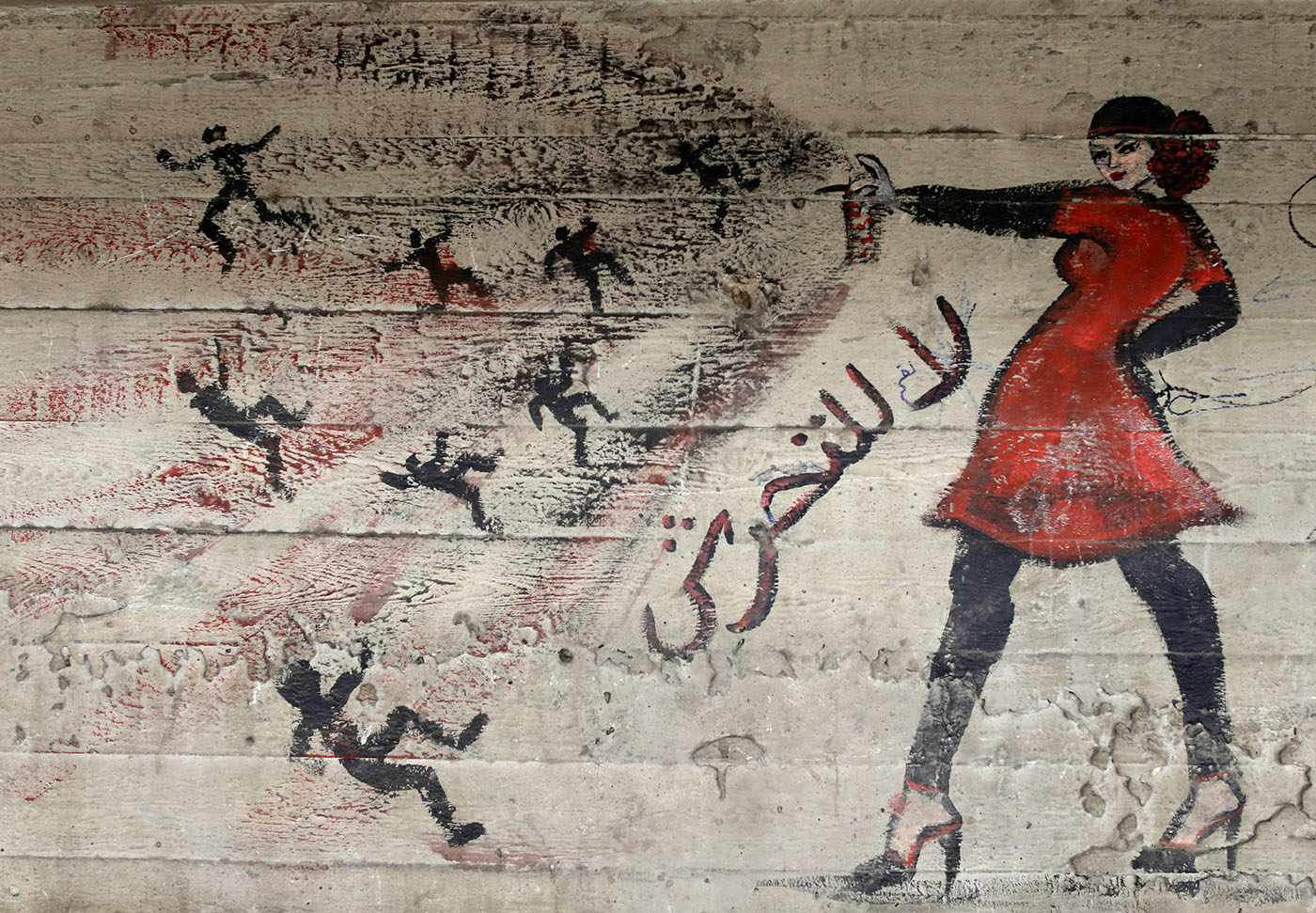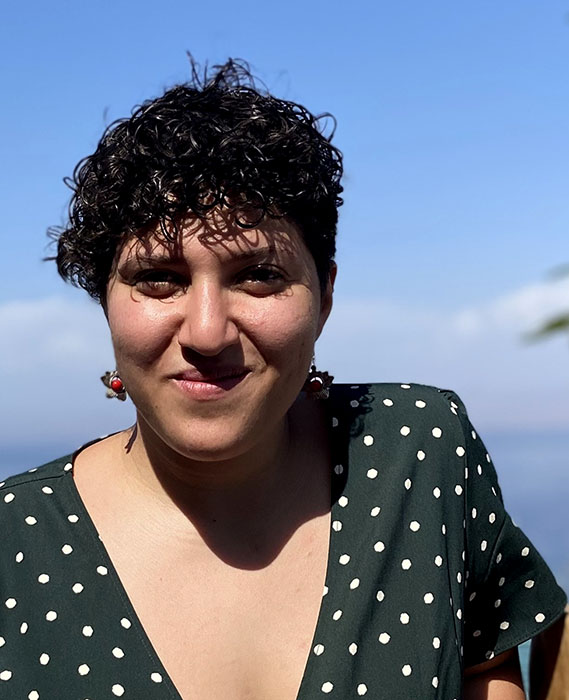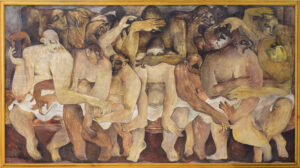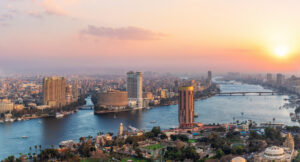Radius: A Story of Feminist Revolution, by Yasmin El-Rifae
Verso Books 2022
ISBN 9781839767685
Sally Al-Haq
On the 25th of January, 2011, a revolution erupted in Egypt. In unstoppable protests, women and men chanted against police brutality and corruption. Tahrir Square was the heart of the revolution that inspired action all over Egypt. After 30 years in power, Hosni Mubarak resigned in February. The military took over until the elections were won in 2012 by Mohamed Morsy, the Muslim Brotherhood candidate. With growing dissatisfaction and newer conflicts, revolutionary groups announced that the revolution would continue. In late 2012, reports of mob sexual assaults against female protesters appeared in Tahrir Square. In response to the attacks, a number of civilian organizations assembled intervention groups to rescue women.
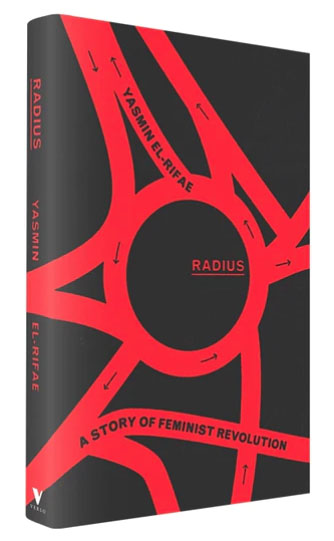
One of them was Operation Anti Sexual Harassment (Arabic: قوة ضد التحرش, transliterated: Quwwa did al-taharrush, also known as OpantiSH).
The writer Yasmin El-Rifae sets out in Radius: A Story of Feminist Revolution to tell OpantiSH’s story. Radius stands as a reminder/documentation of what a group of people can do when they organize for women, in a context where sexual violence is so ambulatory in our memory, so present yet so gaslighted. Sexual assault during the days of a revolution carries its own pain and betrayal.
The book is well-crafted in its blend of interviews and history, including not only the author’s experiences, but serving as a kind of collective memoir. I first met El-Rifae in 2013 following an OpantiSH intervention. She was collecting the volunteers’ tee-shirts after use, and as I was handing her mine, she asked if I was ok. I remember a wordless smile in downtown’s Bab al-Louq and my gratitude towards the gesture. A few weeks ago in Cairo, at the start of Spring, I celebrated El-Rifae’s book with an audience in Cairo’s Zamalek at the NVIC. This review is a continuation of what began at the book talk in March.
Radius speaks of the group’s collective response to a series of mob sexual assaults in Tahrir Square in late 2012. The group was organized by activists who could broadly be described as leftist and were on the frontlines of the revolution. OpantiSH remained active until 2013. It managed to recruit a good number of volunteers — women and men who were enraged at the stories of what was happening to the women protestors in the square, who were assaulted, beaten or raped. A 19-year-old girl was raped quite viciously with a knife. Those who intervened wanted to do something to keep the square safe for women to protest, celebrate and simply be.
El-Rifae takes us on a journey of her own experience within OpantiSH as one of its main organizers. She also invites readers to contemplate her distant memories in Cairo; her university years and hopes.
The book is divided into four parts. The first narrates the structuring of OpantiSH, its urgent birth and strategies. It shows scattered images of sexual violence in Tahrir Square and its surroundings, the collective power of intervention and moving amidst such danger. Part two digs into feminist articulations within OpantiSH in its operation times, and in-depth reflections within the conducted interviews that read into the societal roots of what led to the assaults. This part questions when we consider women survivors or/and victims. Part three is about the in(accessibility) of memory and the possibility of losing the 2011 revolution. Part four features the author’s inner world, leaving Cairo for New York. The book concludes with personal reflections on childbirth, parenthood, and explorations of (not) embodying prescripted gender roles.
The word radius invokes the image of a circle. In my memory, OpantiSH puts one in mind of many circles, including formed circles of men around women. I can almost immediately feel a looming sense of control as my body heats up and my breath shortens. I am taken back to a balcony of a safe house where my 10-years-younger-self was absolutely shocked to see mobs forming around women. I remember the agony and the echo of my comrade’s tears and screams as she counted the circles. It was the first OpantiSH intervention to secure a route to safe houses for the assaulted women. There was a growing sense of helplessness but also the kind of anger that unites people to do “something,” as El-Rifae writes:
How did this happen? How did people — women and men, but especially women — find it in themselves to use their bodies, to risk their minds, to save strangers? What did they do with their fear? —Yasmine El-Rifae
On the night of January 25th, 2013, I was one of the few volunteers with OpantiSH’s safety teams. I held out for no more than 30 minutes in the square that night. I remember the thousand irritatingly small steps as we slowly got closer to the safe house, which was probably only 10 meters away. My teammate was so much taller than me, I held her hands and we anchored each other. She told me to try my best not to fall. Big circles were formed around us. Rapid. Countless. I see these circles now virtually, colored in red on a YouTube video.
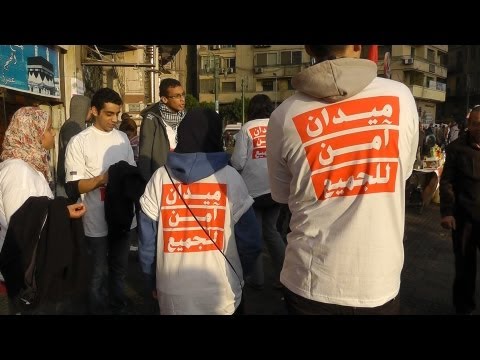
There’s a sentiment of defeat in the book, something about it is quite familiar to Egyptians who supported the hopes of 2011’s revolution. As I read El-Rifae’s reflections on needing a new place without memories, and her very first steps into writing Radius, I wonder: After a crisis is over, how do we remember it and how do we talk about it? Diving into the book, I find that a big part of Radius is the author’s own journey responding to one question she asked early on: “how did this play out for us as individuals moving our bodies and our psyches through such danger?”
Whatever it is that you write in this book, I’ll always have a problem with it. Because I’ll always be looking for the gaps between what you’ve written and what I remember. —Farida, 2018
All interviewees in the book are anonymized. We ease into the first chapter with the intimacy of homes that were turned into meeting spaces for the political initiatives within the revolution. With a growing sense of familiarity, we are with both T and Marwan as they get ready to head out to the square. We accompany them as they carefully choose clothes that couldn’t be easily taken off them, and include items that can be used for self-defense if needed. The first chapter is as disturbing as the events of 2013’s Jan 25th. We learn about how OpantiSH operated logistically, how the volunteers were divided into intervention teams, safety teams, raising-awareness teams, runners and scouts. We see the control room, operating the hotline, and preparing safety kits to support assaulted women. T designed OpantiSH’s tee-shirts. In red letters it said: قوة ضد التحرش-ميدان آمن للجميع.
The chapter recounts 12 hours of violence witnessed and lived by the organizers and volunteers. It ends with OpantiSH’s first press release, in which it condemned the attacks and the failure of revolutionary groups and political parties to secure the square; it mentions a number of 15 cases where OpantiSH intervened to escort assaulted women to safe houses and hospitals, and it sheds light on the social context where, “women who survive these painful experiences face social judgment and derogatory comments and questions about their attire or their reasons for being in the street. Sexual violence is surrounded by a culture of silence, denial, and victim-blaming in our society.”
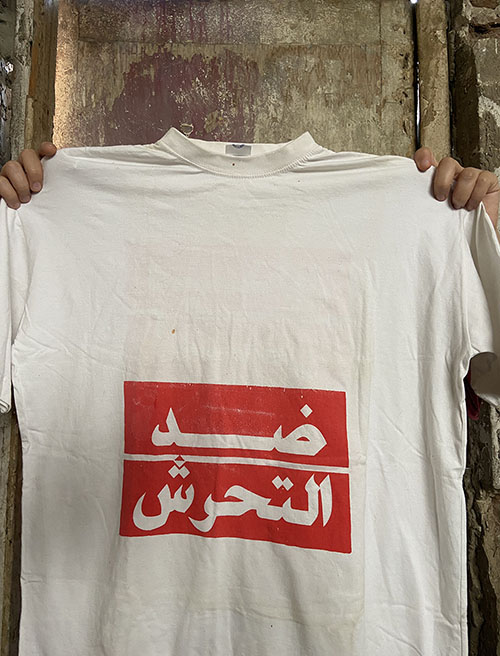
As I reflect on that time, I struggle to understand the concept of mobs — of how a group of men gather and exploit the chaos of the square to violate women in such ways. I remember that at the time, I struggled to understand how our fellow Egyptians failed to stop what was happening, and even looked the other way.
The concept of mobs, and the psychology of one’s choice to harass in a mob, is addressed in an interview with “Adam.” He mentions that he used whispers and gentle touches to bring harassers back to their senses:
People just go crazy, they’re encouraged by the others […] Do you want to be a harasser or do you want to be a hero? […] Never adding to the sense of danger and hysteria by shouting or creating panic. We aimed to be a very quiet force, to allow people to come back to their senses in very small touches.” —Adam
Sexual harassment mobs weren’t new to the Egyptian streets — it is almost a recurring event every Eid in Cairo and many other cities in Egypt. In 2008, during a celebration of Eid Al Fitr, Al Masry Al Youm newspaper reported that dozens of women were assaulted by young men. One woman’s clothes were ripped off her body in Cairo’s downtown in the Mohandiseen neighborhood. In 2014, more than 200 cases of verbal and physical assaults were reported on Eid El Adha.
There is no easy way to explain these mobs, and the reality of them is dark in how women’s bodies are dehumanized and objectified. There’s heaviness in knowing that patriarchy is capable of making men believe that they are entitled and can get away with sexual assaults.
More and more I began to link these intense attacks which have clear objectification of women’s bodies with everything else that has nothing to do with Tahrir … with [female genital mutilation], with marital rape … I linked all of these things together. To me it was just another manifestation of this horrible thing called patriarchy and domination and objectification of women and not feeling that women are humans and not thinking about their pains … it was really clearly manifested in the attacks, but what’s the difference between this and cutting your daughter’s clitoris? —Nahya
In Radius book discussions that took place in Cairo, I admired Yasmin El-Rifae’s expression “flawed political beings,” and I wondered about writing about these flaws years after the revolution. Rana, one of the interviewees and one of the very first organizers of OpantiSH, who stepped aside and joined the volunteer team, criticizes the condescension that she observed within the group: “Like so many revolutionary groups, we had become snobbish and exclusive, only trusting friends or friends of friends. And we didn’t want to get involved in any real political work. You say you’re radical, but you blame everyone else for not being radical enough. It becomes an ideological fight, while people are getting hurt and killed,” she states.
I look at the book again and question whether class was a factor in shaping OpantiSH, or in shaping political spaces in the time of the revolution? Which men were considered trustworthy? What worked and what didn’t? What were the learning lessons in political organizing? Early in the book, El-Rifae states, “This is just one telling of a very real history; within and around it, there are countless others.”
I tried to write the parts that I knew — what the square had felt like, what it smelled like, the way that the urgency of what we were doing took over our lives—but the language was all wrong and my stomach would tie itself in knots, my heart would start racing when I sat at my laptop. —Yasmin
I recall Juliette Singh’s No Archive Will Restore You. In it, she asks, “why this desire for a body archive, for an assembly of history’s traces deposited in me?” OpantiSH is an assembly of history’s traces deposited in us in this particular geography that is Egypt’s Tahrir Square. In El-Rifae’s personal archive of what one day was an urgent reality and what is now history, lies the importance of Radius as a book that we can go back to when we forget, and when we are made to forget.
I am not sure if our psyche will ever comprehend that our revolution in Egypt was also a story of sexual violence. Unlike my foreign friends who always want to visit Tahrir Square, I find it difficult to set foot there now. I don’t romanticize Tahrir Square, mainly because of what men did to women in it.



